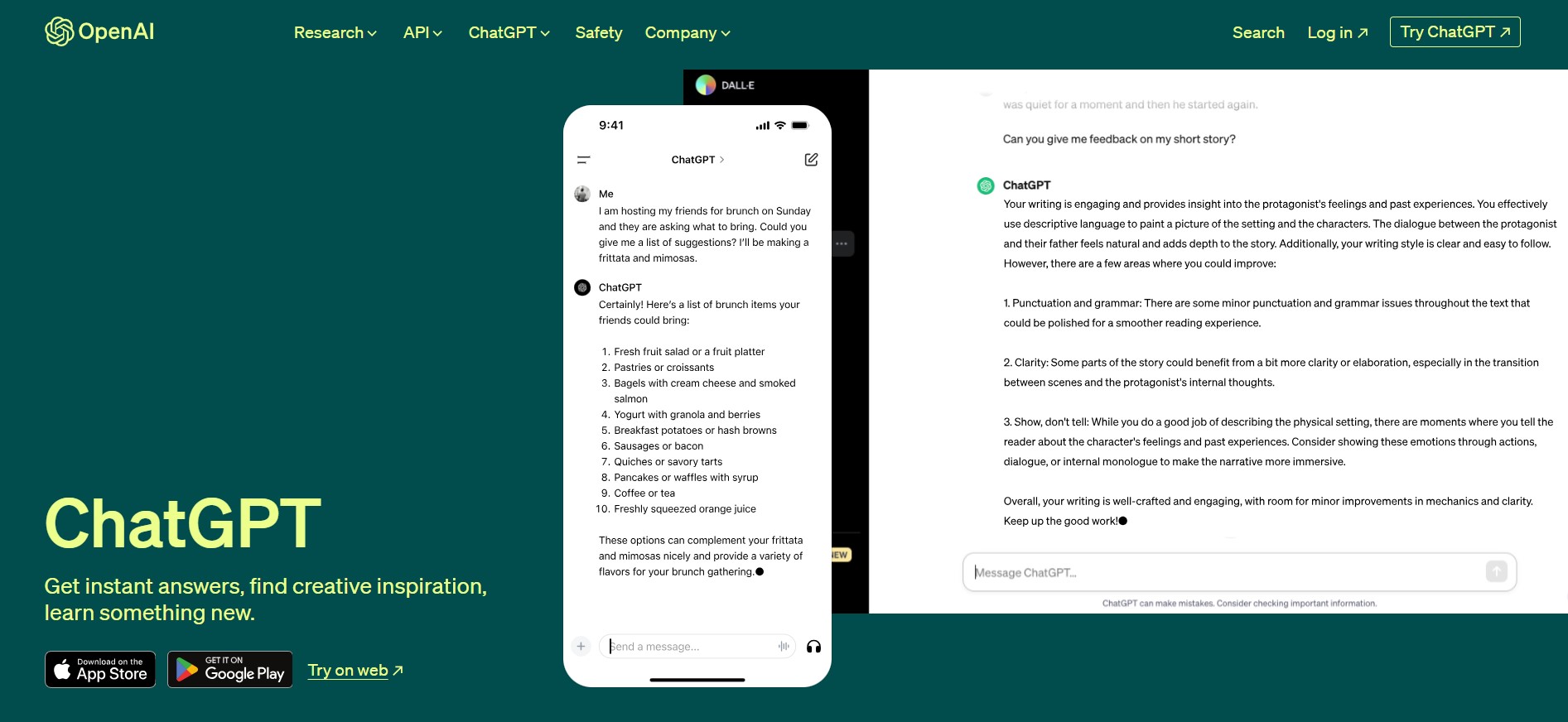Understanding ChatGPT and Its Privacy
ChatGPT, developed by OpenAI, is an AI chatbot powered by a large language model. This advanced technology has raised concerns about privacy and data safety. To answer your question, “Is ChatGPT private?” let’s explore the privacy aspects of this popular AI chatbot.
First, you should know that while ChatGPT is generally safe to use, your conversations aren’t necessarily private. In fact, the conversations you have with ChatGPT could potentially be used for various purposes, such as improving the AI model itself. This might worry you, especially if you share sensitive information in your chats.
It’s crucial to understand the importance of privacy settings when using ChatGPT. By adjusting the settings in your ChatGPT account, you can have better control over your chat data and avoid sharing secrets unintentionally.
Some key points to consider about ChatGPT privacy are:
- The AI model learns from large datasets, which might include your chat data.
- ChatGPT’s usage guidelines require users to refrain from sharing personally identifiable information.
- Adjusting privacy settings helps you to manage the visibility and storage of your chats.
- Staying mindful of what you share in your chats can minimize potential privacy risks.
So, while ChatGPT is impressive in terms of its language understanding abilities, it’s essential to be vigilant about privacy when using the chatbot. Being aware of ChatGPT’s privacy implications will help ensure that you can use this AI tool responsibly and confidently.
How Data Is Managed in ChatGPT
ChatGPT, a popular AI chatbot, manages your data in various ways. To maintain its impressive capabilities, it stores the prompts, questions, and queries that users enter source. However, you can take certain measures to ensure more control over your data privacy.
Firstly, review your settings for data controls. OpenAI has introduced a feature that can help you keep your conversations private, much like an incognito mode source. By enabling this setting, you’re taking a step towards better data management.
In terms of conversation and chat history, it’s crucial to be aware of what you share with ChatGPT. Although the AI chatbot is mostly safe, remaining cautious about sensitive information is always a good practice source.
Furthermore, you can strengthen data privacy by following these steps:
- Regularly clear your chat history, just as you would with other messaging platforms.
- Be cautious when discussing personal information, financial details, or other sensitive topics.
- Check the provider’s privacy policy for more details on what they collect, store, and share.
By actively managing your data, you can take advantage of ChatGPT’s benefits while maintaining a higher level of privacy. Remember to stay up to date on available features and settings – being proactive in your approach will go a long way in ensuring your information remains secure on the platform.

Privacy Features in ChatGPT
When using ChatGPT, it’s essential to understand the privacy features available to protect your conversations. The platform offers several options to help you maintain control over your data and ensure confidentiality during your interactions.
One notable privacy feature is the incognito mode. By enabling incognito mode, you can prevent your chat history from being stored, thus keeping your conversations more private. To activate this mode, look for a toggle or option within the settings of the application.
Additionally, it’s crucial to familiarize yourself with the platform’s privacy policy. By understanding how your data is collected, used, and shared, you can make informed decisions about your privacy rights and preferences. For more information on privacy and safety in ChatGPT, check out the information on this page.
Before you start using ChatGPT, consider the following steps to enhance your privacy:
- Activate incognito mode by toggling the appropriate option in the settings.
- Review the privacy policy to understand how your data may be used.
- Opt-out of any features or data sharing practices you are not comfortable with.
- Limit the personal information you provide in your chats to reduce potential risks.
Remember, while ChatGPT has various privacy features in place, it’s still your responsibility to safeguard your sensitive information and make choices that align with your comfort level. By staying informed and exploring these settings, you can maintain a more secure and private experience when using ChatGPT.
Concerns and Solutions for AI and Privacy

As you explore the world of AI chatbots like ChatGPT, privacy and security become significant concerns. You might worry about the trustworthiness of these tools, potential abuse, and the safety of sensitive information.
One prominent issue is the potential for AI chatbots to unintentionally reveal sensitive information from third parties and advertisers. To mitigate this risk, companies need to employ robust data protection protocols, helping keep your conversations secured and private. Additionally, deploying ChatGPT on a private server can help further reduce data concerns.
In the case of bugs or security flaws, it’s crucial for developers to address and fix issues proactively. Staying vigilant and promptly resolving any vulnerabilities will help ensure the chatbot remains a safe and secure experience for users.
To better protect user information and privacy, here are some measures you can take:
- Be cautious about sharing sensitive or personal information with AI chatbots.
- Regularly update security settings on your devices.
- Limit the amount of personal information you share online or with chatbots.
- Use strong and unique passwords for all your accounts.
Remember, it’s essential to stay informed about the potential risks and keep up to date with the latest advancements in AI chatbot privacy. By doing so, you can have a confident, knowledgeable, and secure experience while using ChatGPT and similar technologies.
ChatGPT in Different Platforms and Its Privacy Settings
As you explore various platforms, it’s essential to be aware of ChatGPT privacy settings. These platforms include widely used services like Bing, Microsoft’s products, Windows, Google, Amazon, and even those provided by companies such as Samsung, Verizon, and popular platforms in Italy.
Bing and Microsoft Edge
When using ChatGPT with Bing or Microsoft Edge, ensure that your private information remains secure by adjusting your privacy settings within these applications. You might want to disable chat history storage at the platform level or clear your browsing data regularly. Additionally, be mindful of the information you share in your ChatGPT conversations to keep sensitive information protected.
Google
As a user of ChatGPT within Google platforms, take advantage of the available privacy settings. Consider using Incognito Mode when chatting or disabling chat history. Keep in mind that storing your chat history could make your data accessible to Google, so avoid sharing personal information if possible.
Amazon
When using ChatGPT through an Amazon device or service, remain vigilant about privacy settings. For example, if ChatGPT is integrated with Alexa, ensure that stored voice recordings are deleted as needed. Moreover, disable chat history or limit the information you share to protect your personal details.
Samsung, Verizon, and Italy
In the cases of Samsung devices, Verizon services or any popular platforms in Italy, make sure that their ChatGPT implementations observe proper data protection guidelines. Watch out for any terms or conditions in business subscriptions that might share your data with third parties. Adhere to a strict protocol of privacy settings and secure data management.
Here are some steps to enhance your ChatGPT privacy across various platforms:
- Disable chat history storage within the application settings.
- Regularly clear your browsing data, especially if using a browser-based platform.
- Limit sharing personal information within your ChatGPT conversations.
By following these practices, you can confidently use ChatGPT on different platforms while maintaining a high level of privacy.
- VPN by Google One: Secure Your Online Activity with Ease - February 27, 2026
- Can VPN be Hacked? Here’s What You Should Know - February 27, 2026
- What VPN Works with MLB TV: Ultimate Guide for Fans - February 27, 2026










Missouri College Student Arrested After Discussing Car Vandalism Spree with ChatGPT
It is NOT private.